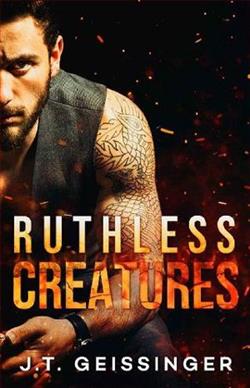Page 63 of Darkness Bound (Night Prowler 5)
“I know. I’m sorry. I know.”
He stroked her arm, trying to soothe her, cooing soft words of encouragement as he gently washed away as much of the blood that had streaked down her lower back and sides as he could. The usmi had avoided the delicate kidney area, thank God, but there would be scars.
There would be so many scars.
Twenty-five to be precise.
Her breathing had changed from shallow to ragged, strained. He looked up from his work to find her staring at him, her lips twisted, eyes glazed in agony.
She whispered, “Boy, that was a real barrel of laughs.” She cracked a smile. Then her eyes squeezed shut, her face crumpled, and she began to cry.
That was worse than anything yet. Her tears were like a sword thrust straight through his chest, punching the breath from his lungs, leaving him weak-kneed and trembling.
Hawk lowered his forehead to hers. Her skin was hot, burning hot.
“Finish,” she pleaded, the barest of whispers. “Please . . . Hawk . . . get it over with.”
When he pulled back he had to look away and swallow, trying to gather his wits and his strength, trying to understand how things had gone so wrong so quickly, trying not to
give way to tears himself.
Mercifully, his dead father’s voice remained silent.
He finished washing the streaked and caked blood from her skin. He applied a thin layer of salve with the lightest touch possible. He laid clean strips of cotton over the ointment, removed her boots and socks, and gave her small sips of water and a tonic to drink that would help the pain and help her rest.
Hawk sat on the floor next to the bed and held her hand until she fell into a still, silent sleep. He stared out the windows through the night, watching over her, keeping vigil until the light rose soft and pink over the tops of the trees.
Then he went downstairs, leaned over the porch railing, threw back his head, and screamed so loudly it sent every bird in the trees within a quarter mile into panicked, shrieking flight.
The New York Times, Tuesday, October 1, 20—
JOURNALIST MISSING, FEARED DEAD
Jacqueline Dolan, veteran reporter and senior war correspondent for the New York Times, has been reported missing. Last seen by a neighbor on the afternoon of Wednesday, September 25, Ms. Dolan initially rose to prominence with her coverage of the Iraq war. The first female reporter to be embedded with an infantry regiment on the front lines of a conflict, she was also one of the youngest reporters ever hired by the New York Times. Over the past decade, she has reported on hundreds of international military conflicts, and has traveled with US troops to war zones in foreign countries on more than a dozen occasions.
A police search of Ms. Dolan’s apartment uncovered no clues into her disappearance, but friends and family speculate she may have been the target of retaliation by the subjects of her Pulitzer-nominated opinion piece, “The Enemy Among Us.” A treatise on the duty of the human race to preserve our culture and history in the face of the Shifter invasion, “The Enemy Among Us” was widely lauded as the driving force behind the adoption of new anti-Shifter legislation both in the United States and abroad, and sparked heated debate on the topic.
For now the investigation is ongoing, but anyone with any information about the current whereabouts of Ms. Dolan are encouraged to contact their local police department . . .
Aside from being a dragon, being a dolphin had to be the most kickass thing in the world.
Slicing through the water at a speed of just over eight knots, Jenna was having the most fun she’d had in a long time. In spite of the seriousness of her mission and the current—awful—outlook for peace between the Ikati and humans, the simple pleasure of leaping over and swimming through seventy-two-degree seawater with a group of twelve other dolphins was sublime.
Pod, she corrected herself, glancing at the sleek forms swimming beside her. A family of dolphins was called a pod.
Though she must look odd to them, pure white as she always was in animal form in contrast with their pearl gray, they’d accepted her with the happy, curious ease of Labradors greeting a newcomer in a doggie park. She’d flown most of the way across the Atlantic toward Morocco in dragon form because it was fastest—skirting the landmass of Spain and evading airplanes where necessary by Shifting to Vapor—but, famished and tired after almost ten straight hours of flying, she decided to rest.
Over the open ocean, there was nowhere else to rest but in the water.
So in she went.
Fish were plentiful, the water was warm, and echolocation proved to be awesome. It took a while to get the hang of communicating through her nasal passages, but if the other dolphins thought her clicks and whistles slightly strange, they didn’t mention it.
The urge to stay in this form was strong, but Jenna was close to her destination now. She had to focus on the task at hand.
She squeaked a farewell—it sounded a bit like a creaking door—thrust hard with her powerful tail, and sailed high out of the water and into the air, where she promptly Shifted to a gull.
A moment of disorientation and some awkward wing-flapping, and she was off.















